If you think “quotes about surgery” means noble wisdom passed down by scalpel-wielding sages, think again. In the real OR, it’s less House of God and more House of What the Hell Did He Just Say?
Between half-paralyzed patients “making breathing excursions” and surgeons shouting “The patient is moving!” while scrubbing ice-cold pre-op prep paint like it’s a crime scene, you start to wonder: is this medicine, or a live improv show with retractors?
So grab your coffee, adjust your sarcasm levels, and prepare for a deep cut into the absurd theater we call surgery.
Table of Contents
Of all the places to collect “quotes about surgery,” the OR delivers the finest specimens. It’s a pressure-cooked environment where life hangs in the balance—and apparently, so does linguistic accuracy.
Some surgeons speak like they’ve swallowed a Latin dictionary, peppering the air with multisyllabic masterpieces that sound like they’re narrating a medical documentary no one asked for. Others? They just say things. Loudly. Confidently. Sometimes while you’re still taping the eyes shut.
This is not a curated list of surgical wisdom. This is the unintentional comedy of high-stakes medicine—served with sterile gloves and a healthy side of what the actual hell.
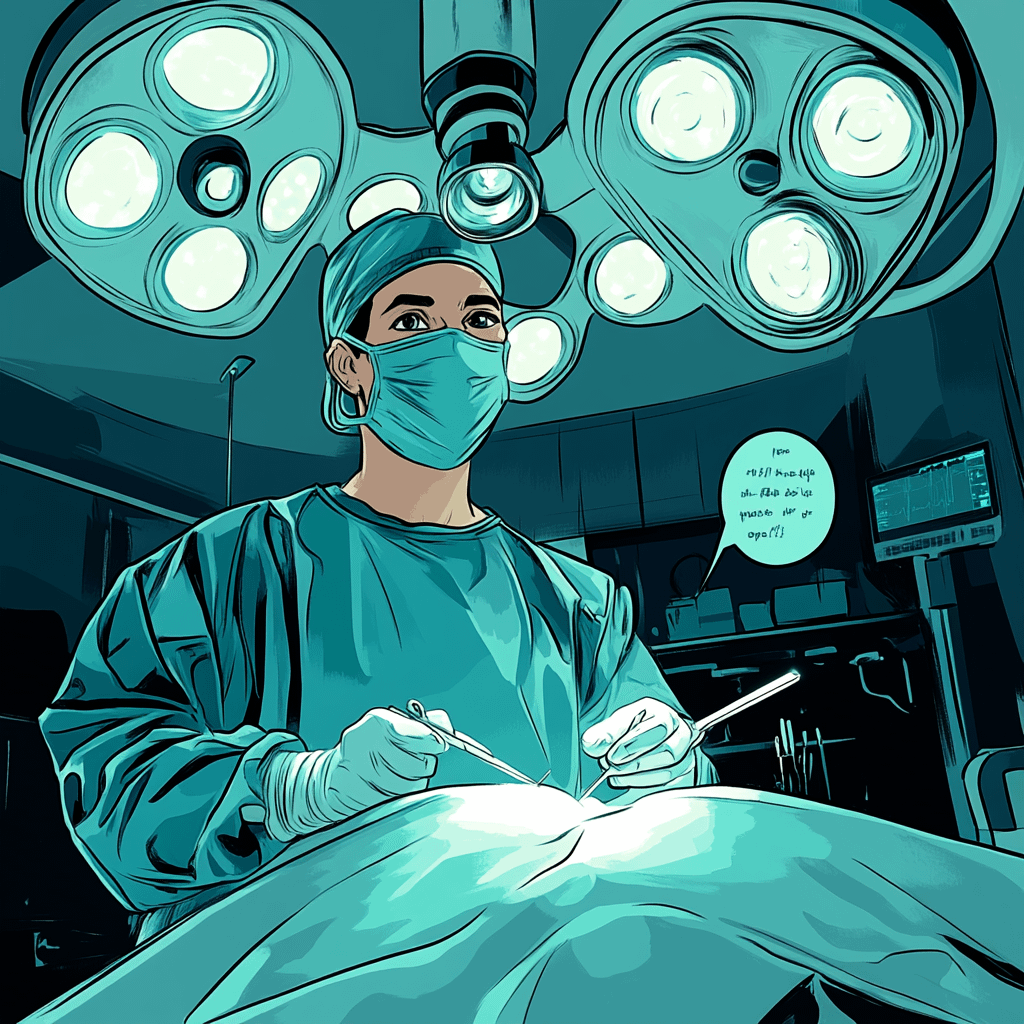
While these quotes about surgery bring some much-needed laughter, working endless night shifts isn’t nearly as funny. Here’s why night shift is bad for you (and no amount of sarcasm will save you).
10 Quotes About Surgery That Deserve Their Own Peer-Reviewed Paper
Let’s be honest—if some of these were submitted to The Lancet, they’d be rejected for “excessive theatrical flair” and “inappropriate use of the English language.” But in the OR? They’re gospel.
Here are ten actual—or very likely—quotes about surgery from surgeons themselves that make you question if we’re saving lives or auditioning for a dark medical sitcom.
1. The patient is making breathing excursions.
Spoken softly, like a verdict handed down by an ancient god in scrubs.
There’s a hush in the room.
As if spontaneous respiration is an act of rebellion, not survival.
What the speaker likely meant:
“The muscle relaxant hasn’t taken hold yet. The lungs, inexplicably, have chosen independence.”
And for a fleeting moment, the patient isn’t a patient.
They’re a human with rhythm.
Ribs lifting against the tide.
Defying protocol. Defying stillness.
It’s not malice.
It’s just biology, stubborn and unfiltered.
But in that sterile pause between induction and control, it feels almost… dramatic.
As if the patient is performing — not gasping — rehearsing a slow-motion ballet no one choreographed.
Someone checks the propofol. Someone else exhales louder than necessary.
And then it fades. The quiet takes over again.
Breathing becomes data. Motion becomes silence.
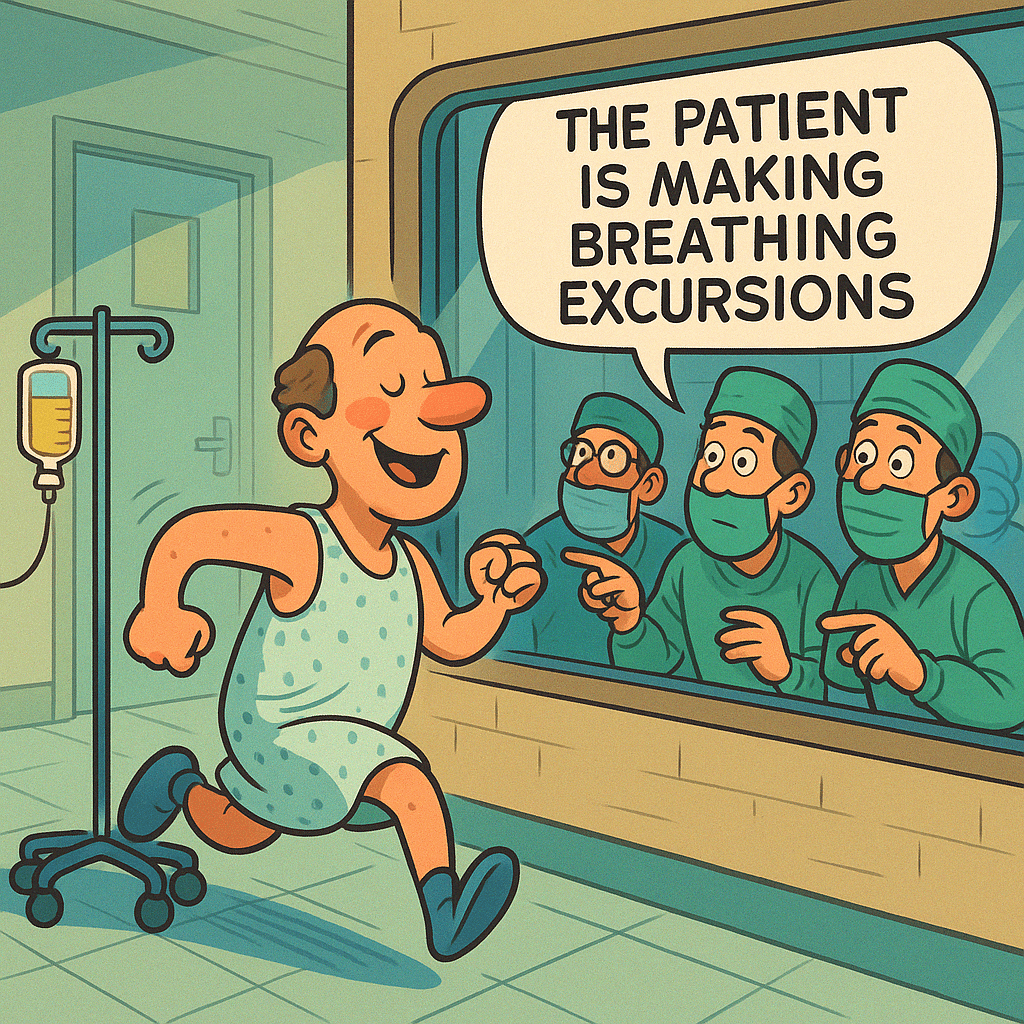
If you think these quotes about surgery are absurd, wait until you hear what happens when you try to eat lunch during a hospital shift. Read about my heroic 15-minute lunch break here.https://propoflol.com/i-took-a-15-minute-lunch-break/
And after surviving breathing excursions, whispered drug pushes, and table rotations based on cranial anatomy, you’ll probably need a proper recovery surface too.
This orthopedic wedge pillow was technically made for post-op patients—
but let’s be honest: it’s perfect for surgeons who’ve just wrestled through ten hours of surgical chaos and frozen OR climates.
2. The patient is moving.
Said with the urgency of someone spotting a prison break.
As if the patient just sat up mid-induction and asked for the Wi-Fi password.
But no.
He flinched.
Because someone applied an arctic antiseptic to his chest like they were baptizing him into the Church of Cold Sterility.
It wasn’t rebellion.
It was thermoregulation.
A last act of free will before paralysis swept it all away.
Still—
That single twitch echoes through the OR like a scandal.
Eyes shift. Someone breathes too loud.
The mood changes from routine to surgical drama with guest betrayal.
He moved.
Not he stirred, not he responded, — he moved.
Three syllables that translate roughly to:
“This man has disrespected the entire anesthesia plan, the induction drugs, and possibly my career.”
You hold the rocuronium like a priest holds incense.
Silent. Calm.
Ready to erase the evidence.
3. Anesthesia is not a cure for high blood pressure.
Heard mid-prep, like a philosophical revelation dropped into the room.
As if we didn’t already know.
As if it wasn’t the first thing we checked.
As if we weren’t already adjusting the plan before they finished the sentence.
We monitor, we anticipate, we hold the line.
We don’t need to be reminded that propofol won’t undo chronic vascular damage.
That a bolus doesn’t fix decades.
That pressure doesn’t politely drop because someone said “sleep now.”
It’s not the content of the statement that stings — it’s the timing.
The implication that we’re winging it.
That we need to be told how this works.
So yes — we know anesthesia isn’t a cure.
But sometimes, what we’re managing isn’t just the physiology.
It’s the noise around it.
4. Turn the table centro-temporo-occipitalis.
Silence fell across the OR. Instruments paused mid-air. The circulator blinked. The scrub nurse’s soul briefly left her body.
We had entered a new era of anatomical orientation—one that transcended cardinal directions and embraced full academic mysticism.
The surgeon, eyes narrowed with purpose, repeated it:
“Centro. Temporo. Occipitalis.”
“Excuse me? Where?”
“To the left … ”
Ah yes. Of course. Naturally. Why use “left” when you can reference three lobes of the brain and a minor stroke?
He didn’t say it like a joke. He said it like he expected compliance. Like this was a standard direction printed in every OR manual and we were the idiots for not internalizing cranial lobe geography as part of table positioning.
Someone reached for the base of the table, hands trembling, and gently nudged it left.
“Perfect,” he said.
We had passed the riddle.
To this day, no one knows what he actually meant. Some believe he was trying to describe a rotation. Others think it was code for “I forgot the word.” Personally, I think he’s just been waiting his whole career to say something that sounded like a Harry Potter spell.
We now refer to turning the table left as “initiating CTO rotation.” It’s a sacred ritual. Only performed under the light of a full moon or when the surgeon runs out of basic vocabulary.
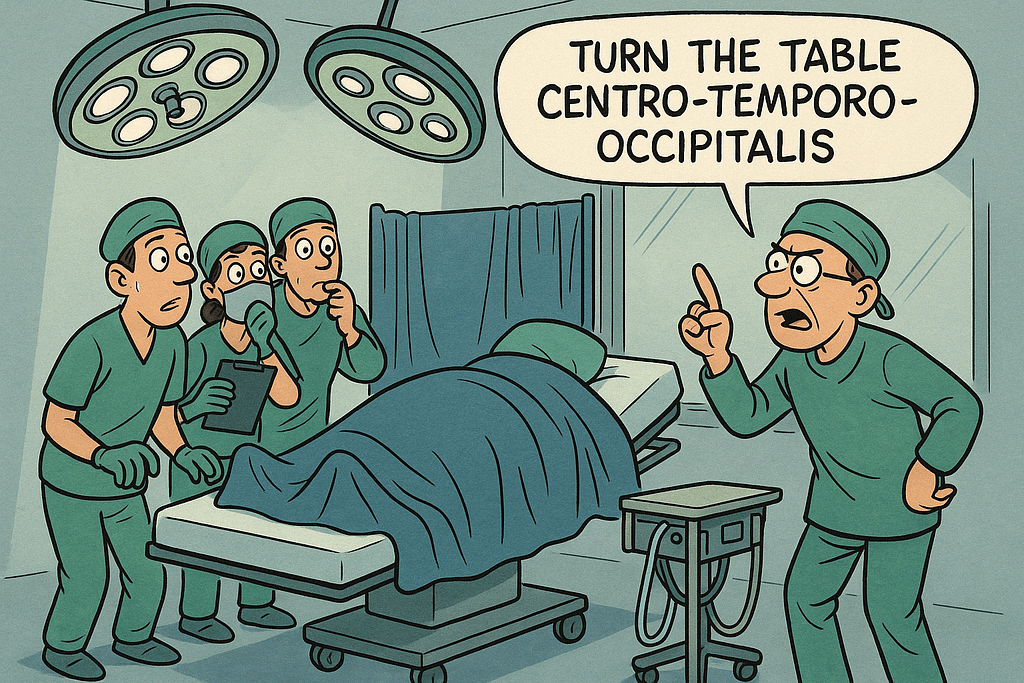
If you thought quotes about surgery were wild, just wait until you hear what the night shift comes up with at 3 AM. You can’t make this stuff up — read it here.
Also — if you’re the type who loves surgical drama (and history that’s somehow even bloodier), Empire of the Scalpel is a must-read.
It’s like watching your favorite quotes about surgery evolve over centuries, but with fewer lawsuits and more amputations. Grab your copy now.
5. Can you speak quieter?
Dark room. Laparoscopy.
Everyone’s calm. Focused. Pretending this is normal lighting for cutting into people.
The screen glows like a campfire. We’re gathered ‘round like the world outside doesn’t exist.
You’re staring at the capnogram.
And there it is. That first little bump.
A hill where there should be a flat line.
You lean in—professional, quiet, practiced:
“Push the relaxant. They’re starting to breathe again.”
Because yes, despite the drugs, the gas, and the ritual silence, the patient dares to show signs of respiratory enthusiasm.
Then, from across the drapes:
“Can you speak quieter?”
Of course.
Because the real problem isn’t the capnogram waving like it’s at a concert.
It’s your whisper disturbing the ambient tension.
You nod. You say nothing.
Relaxant’s in. Capnogram behaves.
Everyone’s happy.
Especially the vibe.
6. I can’t work under these conditions.
Declared like a union strike. Except the union is one man. Wearing two lead aprons. In a room so cold it could preserve mammoth tissue.
18 degrees Celsius.
That’s the thermostat setting. Not a suggestion—an edict. Because apparently, sterile focus requires arctic wind chill.
Meanwhile, anesthesia is tucked under two blankets, a forced-air warmer, and what might’ve been a leftover OR drape fashioned into a makeshift duvet.
The nurse is shivering so hard they’re triggering the pulse oximeter alarm. The resident has lost feeling in three fingers. The only thing still warm is our collective denial.
But Dr. Circulatory Supremacy declares, without irony:
“I can’t work under these conditions.”
Translation: someone dared to nudge the room above meat locker status.
It’s not about comfort. It’s about dominance. And hypothermia. Mostly hypothermia.
The real miracle? The patient’s still normothermic—because we’re doing our job, buried in fleece while your breath fogs up your loupes.
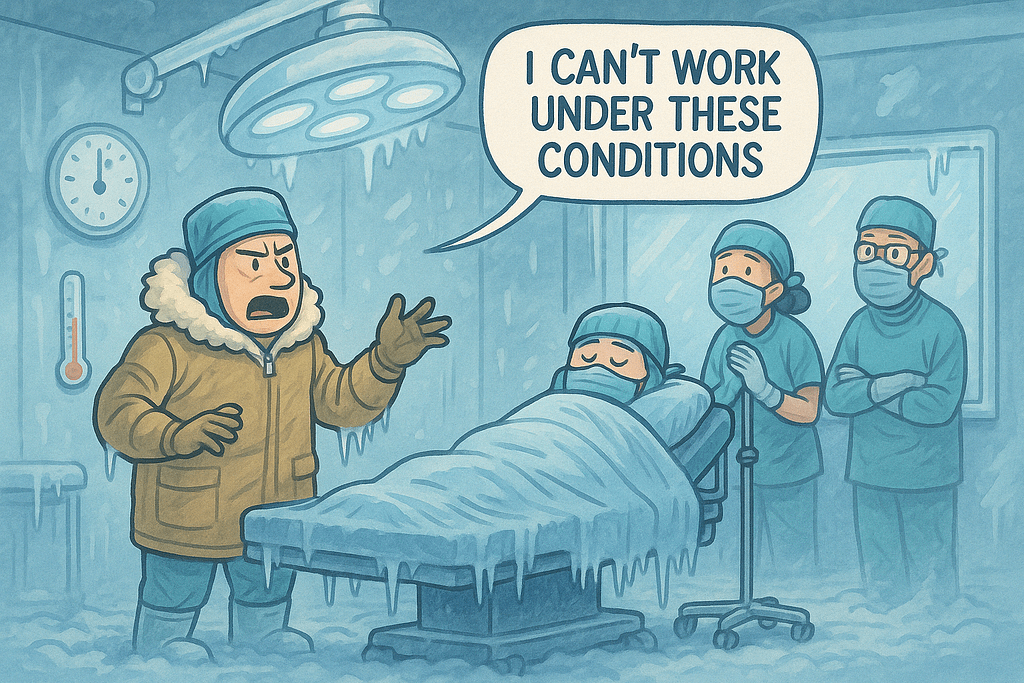
if you’re still recovering from these quotes about surgery, don’t worry—medicine has even weirder material. Check out these funny medical condition names we honestly wish were real.
Also, if your knees are screaming louder than a pager at 3 AM after standing through five surgeries, do yourself a favor and grab an Incredibrace knee sleeve.
It’s technically for “patients,” but after today, you’re basically one too.
Find it here before your joints start issuing formal complaints.
7. Is the patient going to wake up soon?
He asks it quietly.
Not out of fear.
Not regret.
Not even because he’s late for the next case.
He asks it like someone who’s been holding his breath through hours of delicate stitching,
threading tissue and hope in equal measure.
You glance at him—still gowned, still gloved—his eyes fixed on the monitor,
as if watching it might will it forward.
The room is calm now.
Machines hum their post-op lullaby.
Your drugs are wearing off with the grace of a tide receding, and already,
the first lashes flicker.
“Yes,” you say. “Soon.”
He doesn’t nod.
Just stays there for a moment longer,
like he owes the patient one last vigil.
Not because he doubts you.
But because in that question—
there’s a promise only we understand.
8. Oops.
The only word that can defibrillate an anesthesiologist faster than a flatline.
At first, it was just a murmur. A gentle sound. Barely louder than a sigh.
You almost missed it.
But then… the field turned red.
Instantly. Aggressively. Like someone had poured a bucket of Cabernet onto the abdomen.
The scrub nurse went silent.
The tech whispered a curse in a language nobody’s fluent in.
And anesthesia?
Stood up.
No more comfy chair. No more scrolling through vitals like it’s Instagram.
We were all on our feet now—watching a surgeon go from delicate dissection to full-blown beast mode in 0.3 seconds.
Clamps flying. Swabs vanishing into the void.
Every instrument was now a weapon in a war against that one rebellious vessel.
No one spoke.
Except the surgeon—who calmly, reverently, whispered the second worst sentence in the OR lexicon:
“Suction. Now.”
And that’s when you know:
This is no longer a procedure.
This is a reckoning.
Meanwhile, no one brings up the “Oops.”
Because in this room, that word now lives in legend.
It started the battle.
And hopefully, it won’t end the shift.
9. Pass the Clamp! No, not that one!
Issued like a divine commandment. Except heaven’s on break and scrub’s playing surgical charades.
The tray glistens with a dozen nearly indistinguishable clamps, each one silently auditioning for the role of “wrong choice.”
“Pass the clamp,” he says again. Louder.
A hand hesitates. Then reaches.
“No. Not that one.”
The room freezes. The air thickens. Somewhere, a pulse ox alarm beeps in sympathy.
He doesn’t point. He doesn’t name.
Just: “The other clamp.”
Which one?
The one with trauma in its hinge?
The one that bites skin like it holds a grudge?
The one you passed five minutes ago but now—suddenly—feels spiritually correct?
Eventually, he nods.
“Yes. That one.”
No apology. No clarification. Just silence, like a riddle solved in reverse.
Translation: Next time, read his mind. Or bring a psychic.
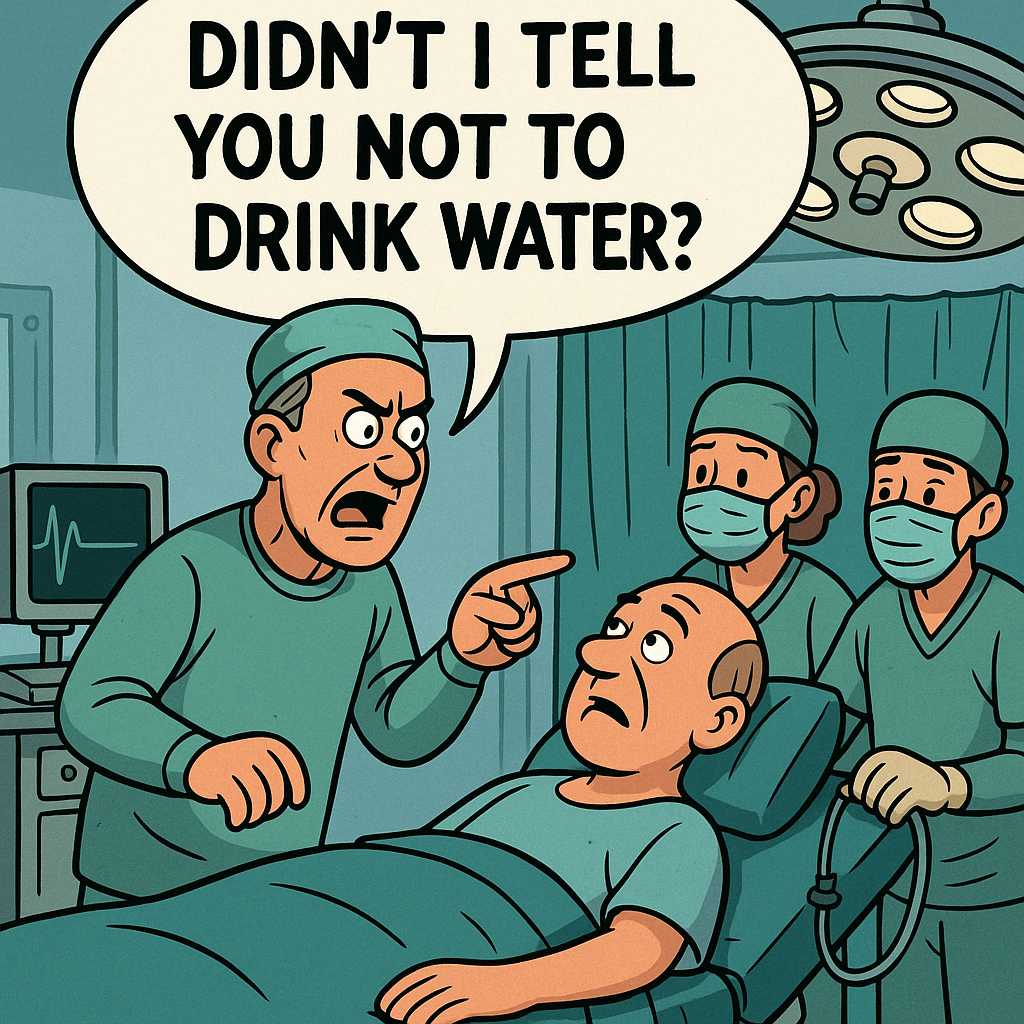
10. Retract the Liver. Gently!
Whispered with the tenderness of a bedtime story, as if the liver is a porcelain doll from a cursed Victorian attic.
“Gently,” he repeats, while leveraging a retractor the size of rural farming equipment.
A low grunt. A slurp. That unmistakable squelch as the organ—smooth, slick, and insulted—slides begrudgingly aside.
The assistant’s hand trembles under the strain of surgical origami. The suction nurse is now on liver watch.
Anesthesia glances up briefly—this isn’t their first hepatic heartbreak.
“Retract the liver,” he says again.
As if it hasn’t already retreated into therapy.
Translation: Fold the liver like it’s a napkin at a royal banquet, but make sure it still works after.
Gently. Always gently.
With enough pressure to expose the porta hepatis, but not enough to summon a hepatology consult.
Every good surgeon has their moments—and thank God they do.
The quirks, the quotes about surgery, the occasional poetic detour into the absurd… it’s all part of what makes the OR tick. Behind the bravado and anatomical one-liners are razor-sharp minds, steady hands, and people who carry the weight of life-changing decisions every day.
We laugh, we roast, but above all—we deeply respect the art.
Even when it’s performed at 18°C.
Truth is, behind every absurd quote about surgery and dramatic pause is a surgeon who shows up, stays late, and holds the scalpel when no one else will. The pressure is real, the stakes are high, and sometimes the only release is a sarcastic comment or three.
We joke because we admire you. We write because we’ve watched you do the impossible.
Even if you occasionally call left centro-temporo-occipitalis.
Share your quotes about surgery in the comments.
Follow us on Facebook and Instagram.
